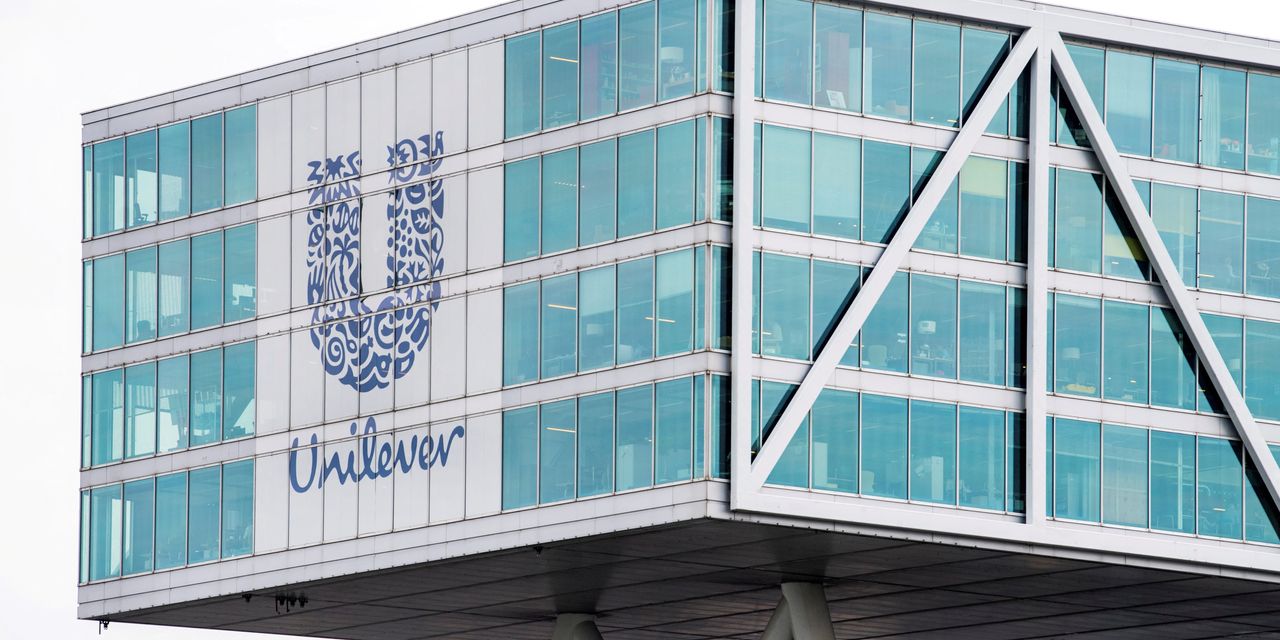
The maker of Dove soap and Ben & Jerry’s ice cream said Monday that buying GSK Consumer Healthcare, which sells everything from Aquafresh toothpaste to Advil painkillers, would be accompanied by significant divestitures as it looks to rejigger its portfolio toward higher-growth categories.
Unilever on Saturday said it had made a takeover approach for the business, which is 68% owned by Glaxo and 32% by Pfizer Inc. PFE -1.06% A successful deal would be Unilever’s largest-ever acquisition and greatly expand its presence in oral care and vitamins, as well as give it a new foothold in over-the-counter medicines.
Glaxo said Saturday that Unilever had made three proposals late last year, which it rejected on the basis that they undervalued the business and its future prospects. The latest proposal, received on Dec. 20, valued the business at £50 billion—equivalent to about $68.4 billion—and was made up of £41.7 billion in cash and £8.3 billion in shares, it said.
The unexpected approach for the business, which Glaxo has been preparing to spin off later this year, was widely questioned by analysts over price, strategic fit and the ability of Unilever’s management to pull off such a sizable deal. Unilever’s shares fell more than 7% in morning trading.
Unilever, which has been under pressure to accelerate growth, defended the rationale for such a deal, saying Monday that health, beauty and hygiene offer higher rates of growth thanks to the potential for innovation. The company also said it could benefit from its existing footprint in such categories in emerging markets like China and India.
Chief Executive Alan Jope told reporters on a call that the company is attracted to consumer health because it is a relatively unconsolidated sector with promising growth prospects as people age and become wealthier.
In recent years, consumer-goods giants have sought to add health and wellness brands as shoppers spend more on self-care and products meant to stave off sickness or slow aging. Nutrition products have been a particularly strong seller during the pandemic. Last year, Nestlé SA agreed to buy the main brands of vitamins maker Bountiful Co. for $5.75 billion while Unilever in November said it would buy Los Angeles-based vitamins maker SmartyPants.
Unilever said big acquisitions to fulfill its strategic ambitions would be accompanied by the sale of lower-growth brands and businesses. “This is a portfolio rotation that would also include divestments,” said Mr. Jope. “This is about improving the quality of Unilever, not necessarily the size.”
Mr. Jope wouldn’t be drawn on the likelihood of a fresh bid for Glaxo’s consumer-healthcare unit, other than to say that Unilever “would not overpay for any assets.” While the Glaxo business was an attractive option in consumer health, “it’s not the only option,” he added.
For many, Mr. Jope’s comments offer the clearest intention yet of the company’s plans to further de-emphasize food.
Although Unilever has sold food since its inception, with the company’s roots in butter and margarine dating back to the late 1800s, its food arm has grown more slowly than other businesses like beauty and personal care. Unilever for years has faced calls to spin off or sell the division, which houses brands including Ben & Jerry’s and Hellmann’s mayonnaise.
Other major consumer products companies such as Procter & Gamble Co. , Reckitt Benckiser Group PLC and Colgate-Palmolive Co. are mainly focused on businesses like personal care, cleaning and consumer health, while others like Nestlé SA have exposure to categories viewed as more promising, such as coffee and pet food.
Mr. Jope said while Unilever has no immediate plans to separate its food and refreshments arm, the company would make disposals based on the long-term growth prospects of its various businesses. “It is true that food and refreshment’s long-term growth profile has been below other parts of the portfolio,” he said.
Unilever in recent years has sold off big chunks of its food business. It sold its spreads unit for about $8 billion in 2018, and in November struck a roughly $5 billion deal to sell the bulk of its tea business.
Still, analysts roundly criticized the approach for Glaxo’s consumer-healthcare business.
“We think this is a very bad deal for Unilever shareholders,” said Bernstein analyst Bruno Monteyne, adding that he thinks Unilever—already struggling to drive growth in its existing business—would struggle further to grow sales of the GSK consumer health business, which was growing slowly before the pandemic.
Jefferies analyst Martin Deboo said that while the benefits of combining the vitamins and oral-care businesses—which make up 45% of the Glaxo consumer health business—are clear, he questioned whether Unilever would be a good owner of the over-the-counter business. “Initial feedback on the deal from investors over the weekend has been almost uniformly negative,” he said.
RBC analyst James Edwardes Jones noted that much of GSK’s consumer-health portfolio involves clinical or medical products that are strictly regulated, creating hurdles to Unilever’s ambitions of rolling these out in new markets the way it is used to doing with more loosely regulated consumer brands.
Another problem for Unilever is that its shares have fallen in recent months and funding a huge deal such as the one it is proposing would require it to take on debt, analysts said. Companies like P&>, Nestlé and Reckitt are seen by some analysts as more likely buyers of the consumer-health business and Unilever’s disclosure could spur similar announcements from others, they added.
Unilever on Monday also said that later this month it would announce a “major initiative” aimed at enhancing performance, adding that the coming changes would allow it to be more agile, improve its focus and strengthen accountability. Mr. Jope said the move would simplify how Unilever operates, locking in efficiencies it discovered during the pandemic.
That effort would follow Unilever’s 2020 consolidation of its longstanding dual British and Dutch corporate structure into a single company based in the U.K.—a restructuring that it said would make it easier to do big deals.
For Glaxo, the planned spinoff of its consumer-healthcare business comes as the pharmaceuticals giant looks to focus more on drug and vaccine development.
Some investors, including activist hedge fund Elliott Management Corp., have urged Glaxo to consider an outright sale of the consumer business, rather than a spinoff, arguing that the proceeds from any sale could be used to boost funding for R&D, pay down debt and buy back shares.
Write to Saabira Chaudhuri at [email protected]
Copyright ©2022 Dow Jones & Company, Inc. All Rights Reserved. 87990cbe856818d5eddac44c7b1cdeb8








